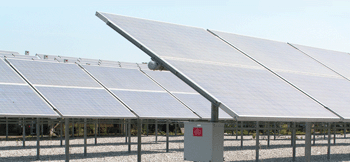 |
| Solar power panels at Bentley Prince Street manufacturing facility |
|
By Steven Feldman
Once upon a time California was ripe with carpet mills. The Golden State was sprinkled with names like Atlas, Bentley, Camelot, Catalina, El Dorado, ETC, Hollytex, Monterey,
Royalty,
Tuftex and many more. But purchases and bankruptcies have rendered the state a shell of its former carpet self.
As one of only four carpet manufacturers left in California,
Bentley Prince Street (BPS) remains inspired by the state’s culture, design trends and natural beauty. Its designers are heavily influenced by the wealth of glamour, architecture, diversity and traditions found within cities like Los Angeles. But they must operate within the framework of the state’s environmentally progressive policies.
“The fact we are a California manufacturer is one of our largest differentiators from other carpet mills,” said Anthony Minite, president. “The state’s VOC reduction requirements and CO2 emission levels are the most stringent in the country; they have to be rolled back to 1990 levels. From sheer environmental regulatory requirements, our company has built an operation that puts the environment first and foremost.”
Specifically, BPS differentiates itself in a number of areas:
1.Manufacturing: BPS’s California mill was the first carpet manufacturing facility in the country to receive a silver rating from the U.S. Green Building Council’s Leadership in Energy and Environmental Design Green Building Rating System for Existing Buildings (LEED-EB). In addition, BPS is the first manufacturing facility of any kind to be certified under LEED-EB v2.0, which measures how it operates and maintains its facility, including water and energy efficiency, environmentally preferable purchasing policies and green site management. A portion of the electrical energy required for its manufacturing processes is provided by solar power.
“We’re dedicated to producing green products in a green building,” Minite said.
2.Education: The three pillars of sustainability are economic, environmental and social, and it is the latter where BPS displays an unprecedented commitment to the engagement and education of its employees on sustainability issues. The company ensures its associates receive a collective 3,000 hours of sustainability training each year, including curriculum on water and energy savings, as well as strategies to implement sustainability in their personal lives.
Each year, BPS puts on a Green Fair, inviting local vendors to exhibit products and services that will help its employees lower their environmental footprint. Finally, BPS engages its associates by organizing community and volunteer events throughout the community — everything from Habitat for Humanity build days to beach cleanups to tree plantings.
“By successfully completing these volunteer projects within their community, BPS associates learn the importance of sustainability first hand,” Minite said.
3.Sampling technology: BPS is committed to reducing the number of samples it produces by utilizing innovative technology to meet customer needs. Simulated samples make it possible to see large-scale designs and colors via an electronic picture or paper sample, thus saving the raw materials, energy and water used to make physical samples. In addition, BPS is the only carpet manufacturer using Zoom Room technology, which enables customers to look at their projects in full repeat scale in an actual room scene — whether it be their own space that can be downloaded or one of the many it has in the system. Every BPS product is bar coded in a pattern collection book, scanned and then downloaded into a system. The designer or end user can then view their specified product in an actual room setting to scale.
4.Transparency and accountability: BPS delivers on its promise to present truthful, transparent information to its customers. How?
• It annually reports its EcoMetrics, including energy, water and waste info.
• It is the only carpet manufacturer to publicly report its third-party verified greenhouse gas inventory.
• It published the first Environmental Product Declaration (EPD) for a broadloom carpet in North America. EPDs are the only environmental label that report on a product’s life cycle environmental impacts. Similar to a nutrition label, EPDs allow customers to easily compare products and make a decision based on the environmental goals of the project.